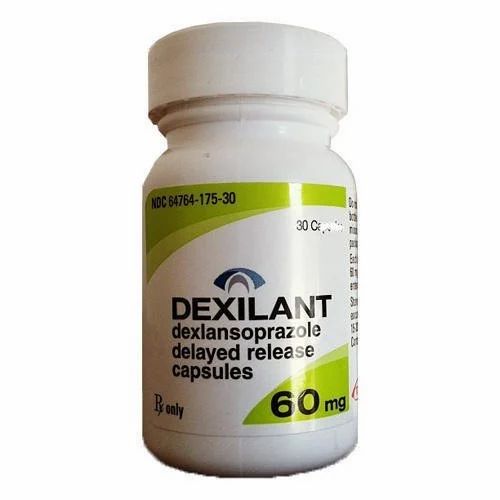Dexilant: Health Benefits & Risks
What are the health benefits of Dexilant?
Dexilant (dexlansoprazole) is a medication used to treat gastroesophageal reflux disease (GERD) and other conditions caused by excess stomach acid. It belongs to a class of medications called proton pump inhibitors (PPIs), which work by reducing the production of stomach acid. Some of the health benefits of Dexilant include:
- Relief of heartburn: Dexilant can help relieve symptoms of heartburn, such as burning chest pain, that occur due to GERD.
- Healing of erosive esophagitis: Dexilant can help heal damage to the esophagus caused by stomach acid, known as erosive esophagitis.
- Reduction of stomach acid: Dexilant reduces the production of stomach acid, which can help prevent damage to the esophagus and other parts of the digestive tract.
- Improvement in symptoms: Dexilant can improve symptoms associated with GERD, such as regurgitation, difficulty swallowing, and chronic cough.
- Prevention of ulcers: Dexilant can help prevent stomach ulcers in people who are at risk due to prolonged use of nonsteroidal anti-inflammatory drugs (NSAIDs) or other factors.
- Long-lasting acid control: Dexilant is formulated to provide 24-hour acid control, allowing for once-daily dosing.
- Improvement in quality of life: By reducing symptoms of GERD and related conditions, Dexilant can improve quality of life for people with these conditions.
It’s important to note that Dexilant should only be used under the supervision of a healthcare provider and as part of a comprehensive treatment plan that may include lifestyle changes and other medications. Dexilant may not be suitable for everyone, and it can cause side effects and interactions with other medications. It’s important to discuss the potential benefits and risks of Dexilant with your healthcare provider before starting treatment.
What are the health risks of Dexilant?
Dexilant (dexlansoprazole) is generally well-tolerated, but like all medications, it can cause side effects and carry certain health risks. It’s important to be aware of these risks and discuss them with your healthcare provider before starting treatment. Some of the health risks associated with Dexilant include:
- Increased risk of infections: Prolonged use of Dexilant may increase the risk of infections, especially in the gastrointestinal tract. This can lead to conditions such as Clostridium difficile-associated diarrhea.
- Bone fractures: Long-term use of Dexilant has been associated with an increased risk of bone fractures, especially in the hip, wrist, or spine.
- Vitamin B12 deficiency: Prolonged use of Dexilant can reduce the absorption of vitamin B12 from food, leading to a deficiency in this important vitamin.
- Low magnesium levels: Dexilant can reduce the absorption of magnesium from the intestines, leading to low magnesium levels (hypomagnesemia), which can cause symptoms such as muscle spasms, irregular heartbeat, and seizures.
- Kidney problems: Rarely, Dexilant can cause kidney problems, including acute interstitial nephritis (inflammation of the kidney tissue).
- Increased risk of fractures: Long-term use of Dexilant may increase the risk of bone fractures, especially in the hip, wrist, or spine.
- Increased risk of pneumonia: Some studies suggest that PPIs like Dexilant may increase the risk of pneumonia, especially in older adults and people with other risk factors.
- Rebound acid hypersecretion: Some people may experience an increase in stomach acid production when they stop taking Dexilant, which can lead to symptoms of acid reflux.
It’s important to use Dexilant only as prescribed by a healthcare provider and to follow their instructions carefully. If you have any questions or concerns about Dexilant, talk to your healthcare provider.
TL; DR: Dexilant Summary
Dexilant is a brand name for the prescription medication dexlansoprazole. It belongs to a class of drugs called proton pump inhibitors (PPIs) that are used to treat acid-related conditions in the stomach and intestines. Dexilant is primarily used to treat gastroesophageal reflux disease (GERD), erosive esophagitis, and other conditions caused by excess stomach acid.
Dexilant works by reducing the production of stomach acid, which helps to alleviate symptoms such as heartburn, acid reflux, and indigestion. It helps to heal and prevent damage to the lining of the esophagus caused by stomach acid.
The dosage of Dexilant will vary depending on the individual’s condition, medical history, and response to treatment. It is typically taken orally as a delayed-release capsule, once daily, with or without food.
Common side effects of Dexilant may include diarrhea, stomach pain, nausea, headache, and flatulence. More serious side effects may include Clostridium difficile-associated diarrhea, vitamin B12 deficiency, and bone fractures. It is important to seek medical attention if you experience any severe or persistent side effects while taking Dexilant.
Dexilant can interact with other medications and supplements, so it is important to inform your healthcare provider about any existing medical conditions or medications you are taking before starting treatment with Dexilant.
It is important to follow your healthcare provider’s instructions closely while taking Dexilant and to attend regular follow-up appointments to monitor your response to treatment. Do not stop taking Dexilant abruptly, as this can lead to a rebound increase in stomach acid production. Talk to your healthcare provider if you wish to discontinue Dexilant or if you have any concerns about taking the medication.
If you have any questions or concerns about taking Dexilant, be sure to discuss them with your healthcare provider. It is important to seek medical advice if you have any concerns about your stomach health or experience any negative side effects while taking Dexilant.




